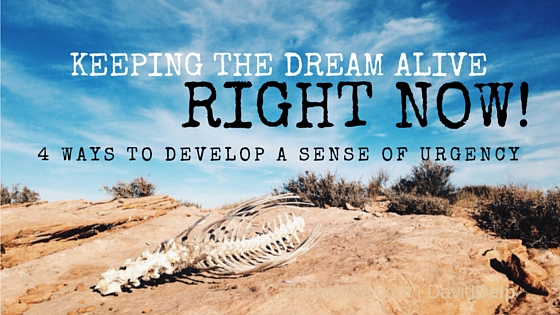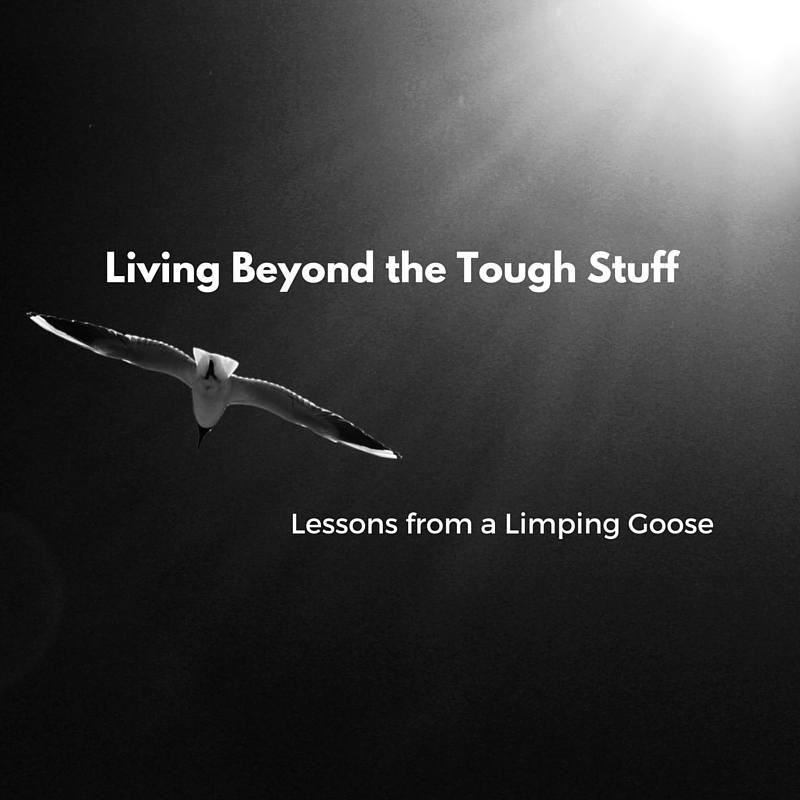by David Delp | Mar 3, 2016 | Leadership, Uncategorized
Your God-given dreams are YOUR responsibility. You have to steward your dreams. You cannot expect someone else to make it happen for you. There are 5 areas of maturity that we must cultivate to properly go forward with purpose.

This is my second post about pursuing our dreams and our purpose. Lately, that’s been a very important subject to me. Like many of you, I have some big dreams in my heart that I believe God has given me. I am intrigued with how our journey of losing spouses has both majorly disrupted the pursuit of life purpose, but has also keenly focused us on what is important and not important, which in turn better prepares us for what is ahead.
In a previous post I wrote about Keeping the Dream Alive. In this post I will explore some lessons I’ve learned in aligning dreams with present context and moving forward with maturity. This post is about taking responsibility for our dreams and not placing the responsibility upon someone else.
Sometimes, when we feel others should lend their influence to our vision, and they do not, improper attitudes may develop. In the church world we call a subversive attitude an “Absalom spirit.” The term refers to the story in the bible (2 Samuel) of Absalom, King David’s son. Absalom’s vision of the future was different than King David’s, and was openly critical of his father. He gathered people around his cause and actively campaigned against David. Admittedly, David made mistakes, but Absolom’s response has become a biblical standard against improper attitudes toward spiritual leadership.
Some see a subversive attitude toward a struggling leader, or a leader with a different vision, as acceptable, but it is wrong. An Absalom attitude, along with being morally wrong, destroys elements necessary to the success of any organization or team: trust, respect, teamwork, and the cohesiveness of character. An Absalom spirit can arise in us when we feel our vision of the future is better and more important than that of the leader or the leadership team.
An Absalom spirit can arise when we feel our vision of the future is better and more important than that of the leader or the leadership team.
An immature leader will sometimes see their vision of the future as more important than anyone else’s. They want their ideas to become the organization’s priorty. Such immature people cannot understand why other ministries and initiatives are not scrapped to free budget resources for them to fulfill their vision.
I once worked with a staff pastor who was doing an awesome job. This team member was already consuming an inordinate amount of the budget on their vision. He grew frustrated because the leadership of the church would not keep fueling him with more and more general resources needed by other vital ministries. His vision was big. His vision was a good vision. It was difficult for him to understand why we could not fund it at greater levels.
Your vision is no one else’s responsibility. If you are a visionary your dreams will always outstrip your ability to pay for it. Part of stewarding a vision is seeking God for the resources to do it. While God is our source, you have to take responsibility for funding your vision and not get “put off” when everyone doesn’t roll over to make your dream happen.
Mature leaders understand when God speaks something to them they have to take responsibility for shepherding the vision. Yes, inspire others, include others, inspire others to find themselves in the vision, maybe it will become their vision too, but do not develop a sense of entitlement that implies that since God gave you a vision everyone else needs to fall in line and see that it gets done.
Here’s the deal… Anybody can have an idea. Ideas are a dime a dozen. I have more ideas floating around in my head now than I will ever accomplish and that would take years of work, sacrifice, and fund-raising to carry out. Not every idea is a God idea. I have ideas about websites and apps and videos and books, the list goes on and on. It is no one else’s responsibility to make the things in my heart happen–it’s mine, and I have to decide what is and is not worth the investment. Anybody can have an idea. So what? Those who can shepherd ideas into reality are valuable.
Anyone can have an idea, the value comes in being able to make it a reality.
The train wreck begins when we see our leaders and our team as “irrelevant,” “too passive,” and Absalom’s pearl–“they just don’t have vision.” And then Absalom talks about it. At the city gate, in the rest room, and worse, he alludes to it in meetings and manipulates others into saying it out loud while he is quiet in a telling way with a knowing look on his face.
I must take responsibility for the dreams and visions God has given me. I have to take responsibility for moving my “great adventures” forward. In moving the God-visions in my heart forward I have to exercise maturity to assure that the things God has put on my heart aligns with His broader plan. How do we keep our dreams and visions aligned with God’s big-picture? How do we protect ourselves from an “Absolom spirit?”
We must cultivate at least five areas of maturity to protect our hearts while moving our God-given dreams and visions forward.
#1 Cultivate maturity in your communications.
Do not have a hidden agenda in your communications, let your “yes” mean “yes” and your “no” mean “no” (Matthew [5:37]). As communicators we know how to “spin” things. Have integrity in the motivation behind your words.
#2 Cultivate maturity in your expectations.
To expect others to take responsibility for fulfilling our dreams is immature. People will only engage with your vision when it becomes their vision, when they can see themselves in it. It isn’t about you.
#3 Cultivate maturity in your perspectives.
An immature person only sees things important to their agenda. A spiritual leader has to have a “big picture” perspective. Organizations and churches are systemic, everything affects everything. Someone has to keep everything in focus and make decisions based upon outcomes affecting the entire organization. To have a team member trying to promote a sliver of the vision over everything else is wearisome.
#4 Cultivate maturity in your pace.
Repositioning, major changes, and culture shifts take a long time. Immaturity and impatience are synonymous when it comes to moving a dream or a vision forward. Timing and alignment are critically important. An “Absolom spirit” is critical of the necessary pace and often pushes for things to move faster than they should.
#5 Cultivate maturity in your understanding of ownership.
When you are the one who owns primary responsibility for a decision, things look differently. The weight of a decision rightfully rests upon the one with the most responsibility. Immaturity presses us to seek the right of decision-making without owning the responsibilities. The primary leader owns the responsibility for organizational outcomes, no matter how many assurances come from team members that they will own the responsibility for decisions. We have to own our decisions and we have to respect the fact that, when under authority, our leaders will also have to own our decisions.
Your dreams fit into someone else big-picture. We do not dream in a vacuum. We must help those we mentor and coach to understand how their dreams, visions, and life-purpose fits into their big-picture. We must also be careful to keep the right attitude toward those over us as we pursue our purpose. It is my responsibility to steward my God-given dream and I must diligently seek to understand how that dream aligns with the context in which God has placed me.
Thoughts?
by David Delp | Feb 19, 2016 | Uncategorized
Life has knocked my dreams off track so many times. There’s a lot of stuff, big stuff inside me. Stuff I believe is from God. Dreams that are more than wishes, dreams that are deeply connected to my purpose for being on this earth. When will I start again? Right now!

Before we can change something, do something important, or lift to the next level we must have a sense of urgency to keep us from settling into our comfort zones.
John Kotter, in his book, Leading Change, lists one of the necessary components of leading an organizational change as “creating a sense of urgency.” Before a leader can lead a group forward, the people have to have a sense of urgency; otherwise, they stay in their comfort zone. I believe the same is true for personal transformation.
“Right now!” is a sense of urgency that moves us to action. If we are to accomplish something important, change something, or move out of our comfort zones, we must have a sense of “Right now.”
Most people have sizable dreams they wish to accomplish someday. I love to develop ideas, write useful things, and help leaders develop the people in their lives. I have a hard time staying on track for the long-haul. I have one book complete, but needing a rewrite, one 25% complete, and another in fragments that need organized and gathered. Those things are just one of my big God-dreams. I’ve already written a lot, developed a lot, its in me–now on to the next level! Right now!
“Right now!” is the time.
We will fulfill our big God-dreams when we get a “Right Now!” attitude. Today will turn into tomorrow, tomorrow will turn into next week, next week will turn into three decades. I have some dreams three decades old. If I nurture them for three more decades without action, “game over.”
Right now!
Charles Hummel wrote a booklet entitled, The Tyranny of the Urgent. I’ve never read it, but the red cover with yellow words is fixed in my mind. The title is all I need to convey whatever message is in the book. Urgent things have a tendency to take precedence over important things. Urgent things are “Right now!” things.
A well-known priority matrix encourages us to prioritize thusly:
Priority One: Things urgent and important
Priority Two: Things important but not urgent
Priority Three: Things urgent but not particularly important
Priority Four: Things neither important nor urgent
Priority three items kill me; urgent items on my action list that do not move my purpose forward, yet I must do them.
Priority two items are my greatest challenge. Things vitally and critically important that can always wait until tomorrow, and too often, they do.
I have a card under the glass of my office desk. I gave a duplicate to my girls when they were teenagers. I’ve seen Kelly’s card prominently displayed in a few locations. The card has a Jim Rohn quote that says, “If you don’t have a plan for your life, you will fall into someone else’s plan, and guess what they have planned for you—not much!”
Other people’s “urgent” will kill your “important.”
We must gain a sense of urgency for important things necessary to fulfill God’s plan and purpose for our lives. Right now!
How do we gain a sense of urgency for the critically important things we often push into “tomorrow?”
#1 Keep your perspective.
Maintain a finite perspective. I have an app on my phone that reminds me, Lord willing, how many days I have before celebrating my 80th birthday. Why? I need to grasp my finite amount of time. I cannot spend my life pushing important things until tomorrow. It is urgent that I move things forward every day. Age 80 is not necessarily my finish line, but that is the number that focuses me on the finite. I’ve learned all too well that life can beat you up and stop you in your tracks if you do not keep perspective.
We must also maintain an infinite perspective. Do your actions and investments affect eternity? When you pass from this life, the only thing that will matter are the investments you’ve made in others and in the Kingdom of God. What must you do today to advance infinitely important things?
#2 Embrace the power of incremental movement.
You cannot accomplish your God-given life plan in a day. We do not accomplish a life plan by holing up in a cabin for a month. You must move little bits and pieces forward every single day of your life. Think of one small thing you could do today, or everyday, to move your plan forward; consider that one thing both important and urgent. Right now!
#3 Define your action items and establish deadlines.
What are the little things you must do every day?
Break your big dreams down into chunks. If you want to write books, focus on the first one. Establish milestones, such as chapter topics and outlines. Put deadlines on your calendar for each of those tasks. What must you do daily to meet those goals? Those daily tasks are important and urgent.
If you cannot move the long-term important into a sense of short-term urgency, you will fail.
#4 Fire your passion.
You can only hold on to a dream if you are passionate about it. If the passion wanes and dies, perhaps it wasn’t a God-dream. I believe passion comes from a God-revelation. You have to renew your passion often to keep important things important and your sense of urgency fired up.
Fix your sights on the big stuff, the big dreams God has put inside you.
Life happens. You will have to adjust your calendar every week. Urgent matters will pop up and you will have to deal with things outside of your plan. But, you must have a sense of urgency about your priorities or you will fall into someone else’s plan for your life—and guess what they have planned for you, not much.
Right now!
I would love to hear about some of the ways you keep your dreams and passions alive.
by David Delp | Dec 16, 2015 | Uncategorized
Every difficult life experience affects us, it affects the way we “walk”. Sometimes a loss or a wound is so great that it affects every single step we take for the rest of our lives. I feel that way. But when the Spirit of God breathes upon us, gets under our wings and lifts us off the ground we soar, our wound doesn’t stop us, we equalize, our limp becomes irrelevant.

Our wounds affect the way we walk, but when we fly our limp is not obvious.
The other day I sat in the conference chapel of our office, looking out the window facing the parking lot. A flock of geese worked their way from the adjoining property onto our parking lot. They picked at the ground and they leisurely waddled across the grass and asphalt.
One goose was wounded. It walked with a decided limp. It struggled to keep up, but it stayed with the flock. I’m not sure what happened to the goose. Perhaps a car clipped it, maybe it almost lost its life in a struggle with a dog. Whatever happened, it’s life was forever changed by what was most likely a brief encounter.
The goose went on with life, stayed with the flock, and kept doing what geese do. The other geese seemed oblivious to the limping goose, it was just another goose.
It occurred to me that when this goose walks it is different, it limps, it is wounded. When the goose flies it looks just like the other geese, you can tell no difference.
I live with a limp. Not physically, but I “walk” with a limp. Actually, most everyone who has engaged life “walks” with some kind of a limp. But we can soar when we transcend the confines of the temporal and move into God’s intentions for our lives.
My lessons from a limping goose:
Ok, so you’ve been wounded, just live life and limp.
The fact that their comrade was limping didn’t seem to bother the other geese. Sometimes we live in our pain to such a degree that we let the rest of the world walk away from us. Engage. Really, your limp doesn’t keep you from engaging life.
The limping goose did not flap its wings and try to constantly draw attention to the fact that it was limping.
When the goose was first injured it probably did flap its wings a lot, keeping pressure off the wound. As time and pain passed the goose normalized. Now, the other geese are like, “oh yeah, that’s just George, he limps, whatever, he’s cool.” At some point we merge back into life with our limps and scars and we roll on. God will use our limps and scars to His glory and our transformation forever, but it becomes a vital accessory and not the focus.
There is a difference between walking and flying.
The events that slam us in this temporary realm (2 Corinthians [4:16]-18) do not dictate what God can do in us and through us. We equalize when the wind of the Spirit gets under our wings and we lift off the ground because we all depend upon the same wind when we fly.
We have to engage both the ground and the sky.
We have to navigate the realities of the world in which we live and we must engage the sky. As long as we live as human beings we will engage the ground, but as followers of Christ we need to learn to engage the sky. Limits yield to the power of the Spirit, present realities yield to the Lordship of Christ.
Yes, I have a limp, and you do too, most likely. I have decided that my limp doesn’t limit me, in fact it only helps me realize how normal I am when I fly. My limp makes me want to fly more. Perhaps that is one purpose of wounds, to teach us that flying is what we’re were really created to do. After all, we can fly and when we like the ground a little less we spend more time in the sky, and that is what we were meant to do–fly.




